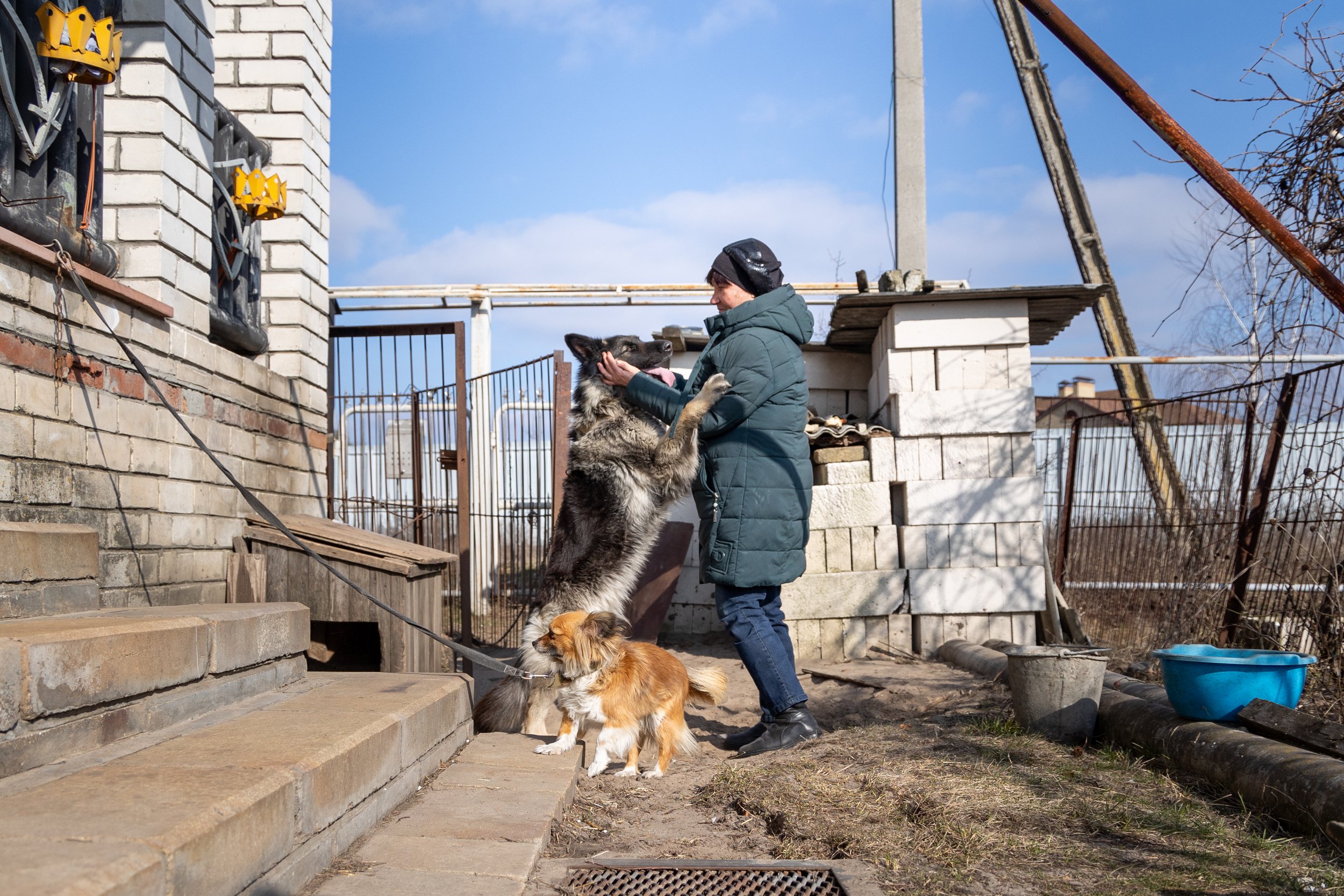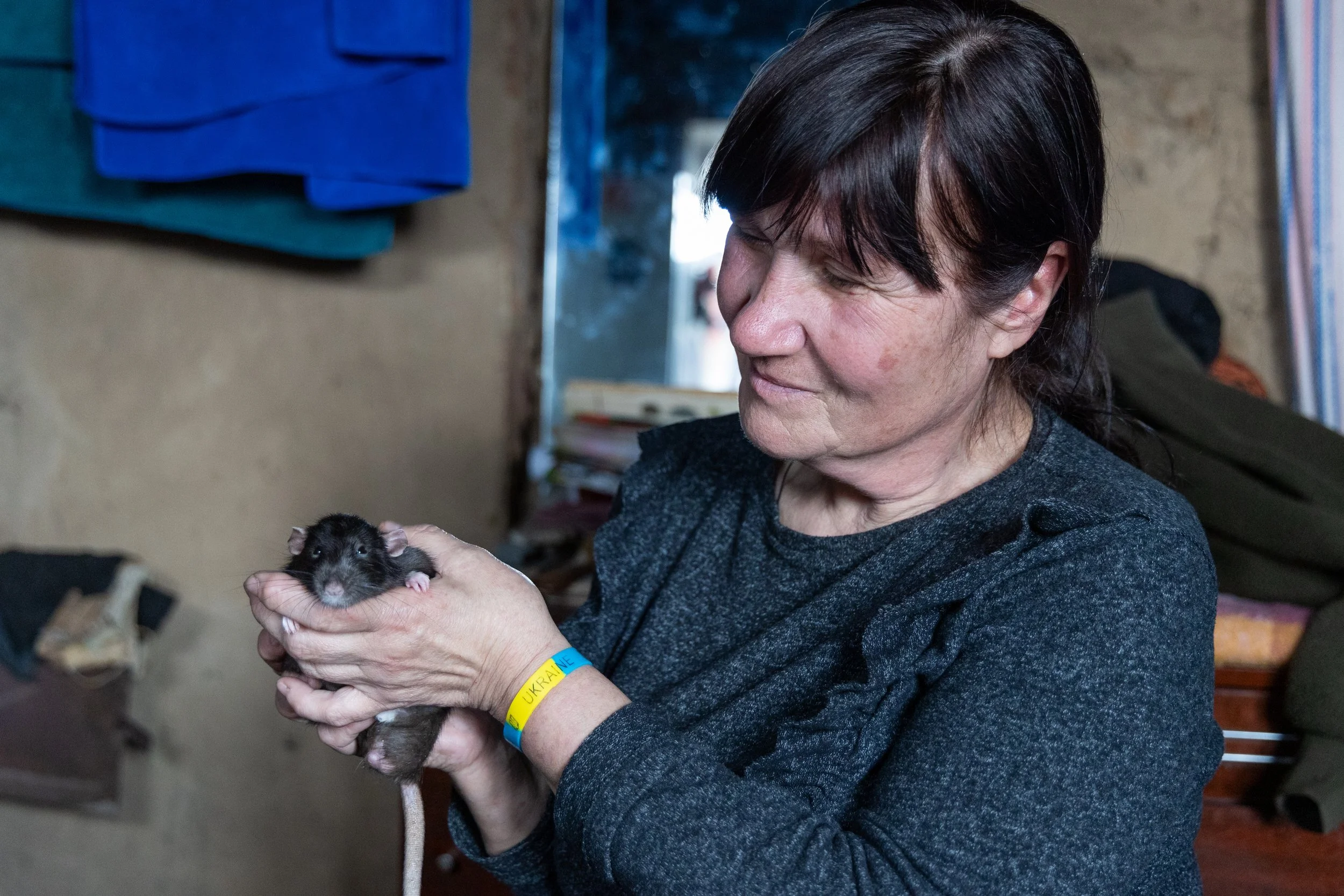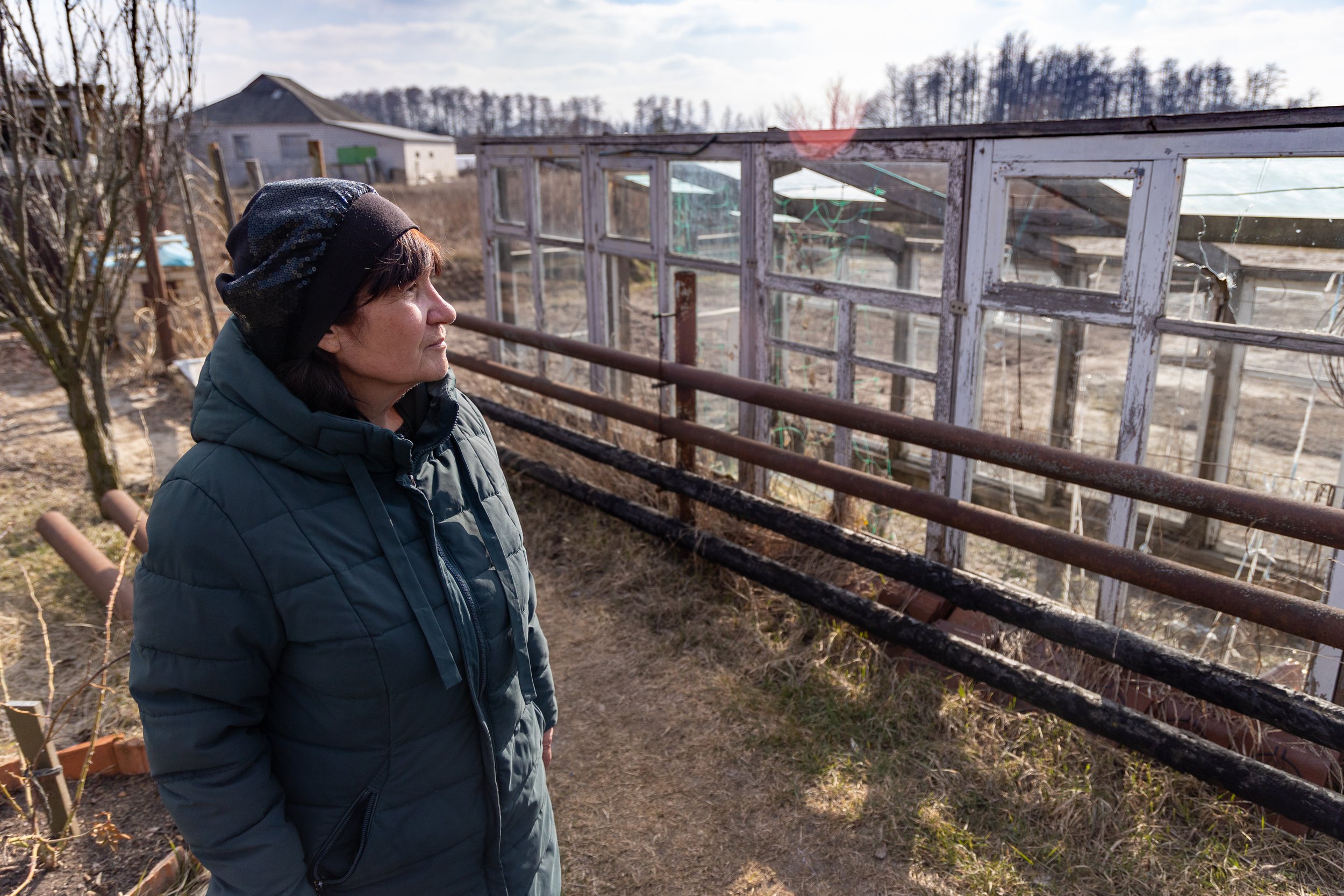
Filling up the dark.
The room is dimly lit. A table is set with small glasses, a bottle of champagne, an unopened jar of pickled gherkins and a packet of biscuits. Elena, 74-years old, gestures to the chairs. She waits for us with her dark, brimming eyes, making sure everyone is comfortable, before sitting down. By now the low hum and occasional hiss from the wood-burning oven have replaced the protective calls of Nicka, Elena’s blue-eyed Alsatian that lives outside. ‘When she was young, we trained her not to fear the sound of fireworks,’ says Elena, smiling with memory. ‘This is why she still hasn’t run away - the sound of gunfire and mines are all the same.’
Elena’s son was twenty-six years old when he died in the Battle of Izyum (March 2022). He is buried in a cemetery in the Scots pine forest that looms less than 200 metres from her front door. Our translator notes that Elena’s home ‘is like a house from a village.’ A traditional, modest, bungalow on the outskirts of the destroyed city. Including the grave of her son, ‘her closest neighbours are the dead’ – all of whom were born and raised in Izyum, many of whom died at the hands of the Russians. Twelve years ago, when she and her husband, Sergey, first bought the house, she was reluctant to live in the shadow of the dark woods and so close to the graves. Now, she says, it is a comfort, ‘the dead can do no more harm than the living.’
The Battle of Izyum saw some of the bloodiest days of fighting. To avoid the shelling and the gunfire, Elena lived in their storage room, an underground outdoor bunker made from breeze blocks and cement. ‘There were nine of us. We moved the wood and jars of food and made space for the children to sleep.’ ‘Wasn’t it cold?’ ‘At first it was terrible, especially for my mother, but then we created a fire and chimney and it warmed to 16 degrees Celsius. Finally, we could sleep. The children played with the shadows of the flames... Slata, my granddaughter created a fairy-tale. It was life-giving... We lived like this for two months.’ After the Ukrainian retreat, Russia occupied Izyum for almost six months (1st April – 11th September 2022).
As the pulsing of artillery and bullet shots began to cease, Elena and her family emerged from their makeshift bunker. Their homeland was unrecognisable. Nothing was the same. Her daughter and grandchildren left for Germany and her mother soon passed away. With no wish to be separated from the grave of their son, Elena and Sergey stayed.
It was at this time, during occupation, that the well dried up. ‘Every three days we would walk two kilometres for water. And twice a week I would climb the hill to call my daughter and grandchildren.’ Even though there was no electricity or power for three months, Elena always found phone reception. ‘God was there.’ Over the phone, her grandchildren would tell her about the German stories they had been learning at their new schools.
Despite their retreat, Ukrainian forces were not far. Elena’s house is situated at the most northern point of the city, at least four kilometres from the now decimated centre. One summer’s day, Elena recalls, she hears a knock at the door. Expecting to find a Russian, Sergey opens it to find a young Ukrainian soldier asking for a shower. With no running water, they quickly concoct an outdoor waterflow using a tin bucket. Soon Elena’s shower becomes a clandestine harbour for Ukrainian soldiers, and it doesn’t take long before she starts serving them food. ‘At one time there were twenty of them here… some of them were the same age as my son.’
A cat leaps up onto the table and Elena’s eyes light up. She strokes its sleek, black back. ‘This is Marsci.’ The young cat paws its away over the biscuits and around the glasses. ‘How many animals do you have?’ ‘Three dogs, Marsci and Chips.’ ‘Chips?’ ‘Yes. The rat. He replaced the parrot that died.’ Elena leans down and takes out a large, soft rat from a cage positioned next to the warmth of the fire. Chips nestles into her hands.
‘‘They help me. Yes. They have replaced my company, my daughter and my grandchildren… Each day I feed the dogs, the cat and Chips and I scratch them under their necks and along their backs.’
After making some tea, Elena begins to describe the state of her mental health. This is the first time I have heard someone use these terms in Ukraine. She went to see a doctor ‘to calm her down.’ He prescribed her antidepressants. ‘They help me.’ She says a routine keeps her mind from sadness; every day she sees the grave of her son and tends to her garden. ‘Do the animals help too?’ ‘Yes. They have replaced my company, my daughter and my grandchildren… Each day I feed the dogs, the cat and Chips and I scratch them under their necks and along their backs.’
After we clear the table Elena places a small log in the fire and we go outside. ‘Where do you get the wood from?’ She gestures us to the back of the garden. ‘Here,’ she says, proudly, revealing a large pile of perfectly sawn wood underneath a tarpaulin sheet. ‘We buy it. Everyone does now – from the administration. Some houses froze during the occupation. No gas, no heat. We were lucky… I am now ready for anything.’ She points us to a freshly harrowed reach of earth, ready for potatoes, cabbage, pepper, tomatoes and radishes to be planted, and we stand together in the midday sun, the forest before us.
Before we go Elena takes me into the makeshift bunker, now recommissioned as the storage room. I duck my head and descend three concrete steps. It is dark and cold. She lights a match and I see row upon row of glass jars, filled with pickled tomatoes and gherkins. For a moment we both watch the shadows dancing on the concrete walls.
‘You see,’ she says, ‘if the Russians come again, we are ready.’
























